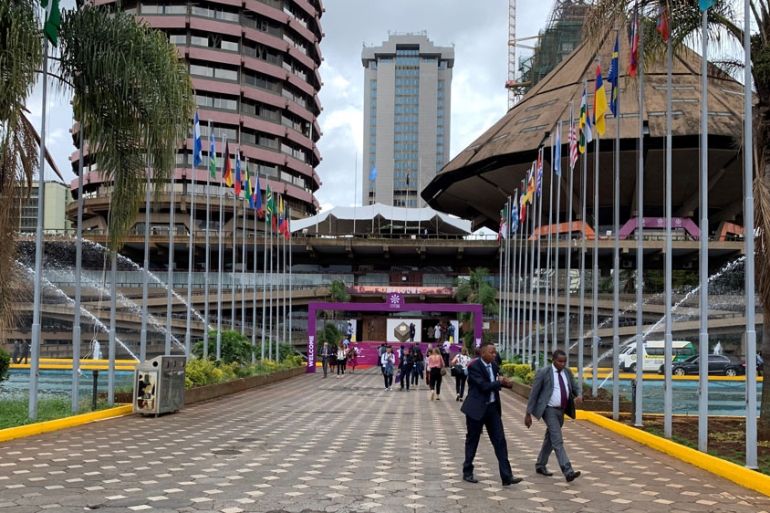Nairobi summit explores progress on issues affecting women
Kenya’s President Uhuru Kenyatta opened summit by pledging to end female genital mutilation by 2022.

Nairobi, Kenya – She sits quietly in a corner of a large tent as journalists scamper to find chairs and power sockets to meet deadlines.
She smiles enthusiastically as the echo of world leaders and dignitaries pledging to do better ring out, followed by applause and cheers.
Keep reading
list of 3 itemsFemale rangers in Malawi: ‘Only the strongest survive’
To solve Africa’s problems, give women a chance
Her name is Nyamal Thok. She is a South Sudanese refugee who at the age of 14 was forced into marriage.
Nyamal is one of 6,000 delegates and activists from more than160 nations attending a three-day summit in Nairobi discussing topics such as ending gender-based violence and progress on women’s health rights.
It is all part of the United Nation‘s International Conference on Population and Development (ICPD) marking 25 years since 150 countries signed a Program of Action Plan drafted in Cairo.
The three-day summit is looking at what progress has been made in the fields of women’s empowerment, sexual rights and education, and access to family planning.
According to the United Nations Population Fund (UNFP), every day more than 800 women die from preventable causes during pregnancy and childbirth, while 33,000 girls are forced into marriage.
More than 230 million women want to prevent pregnancy but are not using modern contraception, and every year more than four million girls face female genital mutilation.
Kenya’s President Uhuru Kenyatta opened the summit on Tuesday by pledging to end female genital mutilation (FGM) by 2022.
He also called on African leaders to do more to end child marriages.
“Early marriages deny our girls the chance to achieve their full potential in education and limits their social and economic contributions,” Kenyatta said.
“The absolute number of girls under 18 who are at risk of child marriage is estimated at 10.3 million in 2019.”
Controversial summit?
Critics have applauded Kenyatta’s ambitious efforts, but they say they are not realistic.
Topics such as women’s sexual and reproductive health are seen as taboo and controversial in certain African nations because of the politicisation of traditional culture against individual or gender-based rights.
Prior to the summit’s beginning, the Vatican said it would not participate because the event was broken down into talking points about sexual and reproductive health rights, which do not take into consideration the views of all nations.
“The organisers’ decision to focus the conference on a few controversial and divisive issues that do not enjoy international consensus and that do not reflect accurately the broader population and development agenda outlined by the ICPD, is regrettable,” said the Holy See in a statement.
The US representative for global women’s health told the conference that Washington would not support abortion in the case of a woman or girl that has been raped, and family planning programmes need to offer more than the option of terminating the fetus.
The anti-abortion rights sentiment is a policy of President Donald Trump. In 2017, Trump’s administration withdrew all funding from the UNFP, about $32m.
UNFP said political pushback is expected based on different regions and governments and that its objective is not to implement all of the global agenda in any single country. Rather, it aims to engage governments constructively and independently.
“All people are equal in their rights. The way the governments fulfil these rights definitely should be within a context of the religion, the culture, and the characteristics of the government structure,” said Dr Luay Shabaneh, UNFPA director for the Arab region.
“The political discussion is political discussion, and it’s across all countries.”
Nyamal Thok’s story
Nyamal’s story begins in 2013 when South Sudan gained independence from Sudan. What quickly followed was a civil war after Sudan President Salva Kiir fired his then-Vice President Riek Machar over accusations of plotting against him.
![Nyamal Thok, a refugee from South Sudan, was one of more than 6,000 activists and delegates to attend the summit [Imran Khan/Al Jazeera]](/wp-content/uploads/2019/11/e7e32f944f7640f383cff3a9714bf005_6.jpeg)
Soldiers loyal to the two leaders clashed and divisions were created on ethnic lines. The war killed 400,000 people and forced one-third of the country’s population to flee their homes, according to the UN.
Nyamal was one of them.
Not knowing where her mother or father were, she fled to a refugee camp with her stepmother, who encouraged her to marry a 42-year-old man.
“My stepmom told me we had no other option. The only option we had was for me to marry that man who had kids who are your age mates and three other wives. It doesn’t matter as long as it [the dowry] feeds us,” she said.
Nyamal told a classmate’s mother about her situation and she agreed to hide her. After a month the man stopped pursuing her. She returned to her stepmother who accused her of betrayal and chased her and four other siblings away.
She eventually reunited with her mother at the Kakuma refugee camp in Kenya in 2016. It houses more than 192,000 refugees with close to 39 percent of the population being women between the age of five to 59.
Nyamal, now 19, started the Kakuma youth parliament – an opportunity to give refugees in the camp from various parts of the continent a voice and to have discourse with other tribes and ethnicities.
She said it is an opportunity to empower women. Something she said continues to motivate her.
“When I see a woman in front of me advising young girls, speaking as a leader, it gives me hope. It gives me power to be that person tomorrow,” said Nyamal.
“I believe in the saying, ‘what a man can do, a woman can do better’.”